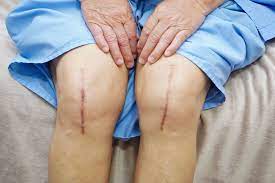What is knee replacement?
Knee replacement is a surgical procedure to cut away the damaged cartilage and bones from the knee joint and replace it with artificial cartilage to relieve pain and restore function in the knee area. It is also called knee arthroplasty. The procedure takes almost 45 minutes to complete and people can start walking within 24 -48 hours. Nowadays it is stitchless and painless.

Overview
Indians have a tendency to sit on the ground and do various work which is why; we in India face a lot of knee problems when compared to other parts of the world.
The knee is the largest and most complex joint in the human body. It is made up of 3 bones-thigh bone (femur), a bone at the front of the lower leg (tibia), and a thick triangle-shaped bone which sits over the other bones at the front of the knee (patella) or kneecap. There are ligaments to hold these bones. There are coatings in between the knee bones called cartilages which help in the movement of bones. These cartilages get damaged with increasing age. When the cartilage gets damaged completely then the bones get worn out Known as arthritis or osteoarthritis which comprises 80-90 % of the knee joint pain. Osteoarthritis is the main reason for knee replacement.
Types of Osteoarthritis-
Stage 1 -Cartilage and meniscus are somewhat worn out showing some patches
Stage 2 -Cartilage is half worn out
Stage 3- Cartilage is completely worn out
Stage 4- When cartilage is completely worn out and has damaged the knee bones
What keeps your bones healthy-
- Calcium- The body requires 1000 mg of calcium every day. E.g half a litre of milk has 600 mg of calcium and the rest 400mg can be obtained from other vegetables and fruits
- Vitamin D which helps in the production of 50% of the bones- Enough exposure to sunlight
Treatment plan-
- Stage 1- advised exercises
- Stage 2- Pain relief by steroid, viscose, hyaluronic acid injections, etc.
- Stage 3 onward- Repair surgery
Who should undergo knee replacement surgery?
- If a person is requiring 2 or 3 painkillers per week then knee replacement is mandatory
- If a person can’t walk for a longer time e.g morning or evening walks
- Persons facing difficulties performing daily activities like cooking, going to the toilet, can’t sit properly, etc
Durability and longevity of knee replacement
Earlier it was 15 years but today it is 25 years and is done by 2 types-
- Cobalt chrome
- Zirconium- Its longevity is 25 -30 years
Complications/ Risks
- Osteoporosis- can be tested by BMD(Bone mineral density test)
- When a patient is Diabetic the chances of infection arises
- Smokers
- Stroke
- Nerve damage
Do’s and don’ts
Do’s
- Yoga
- Pranayam
- Walking
- Swimming
- Cycling
- Climbing stairs
- Playing badminton
- Driving
Don’ts
- Football
- Skipping
- Jumping
- Fast running
- Any aggressive exercise
Benefits
- Pain relief
- Improves mobility
- Better quality of life
To know more about knee replacement surgery, you can watch the video by Dr. P.C Dey, Director
HOD Orthopaedic Endospine & Joint Replacement Surgery




